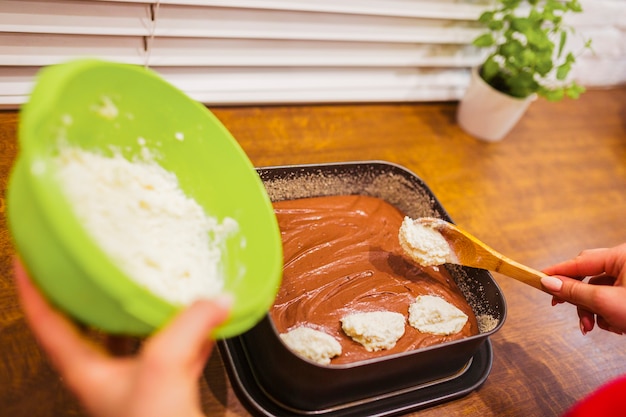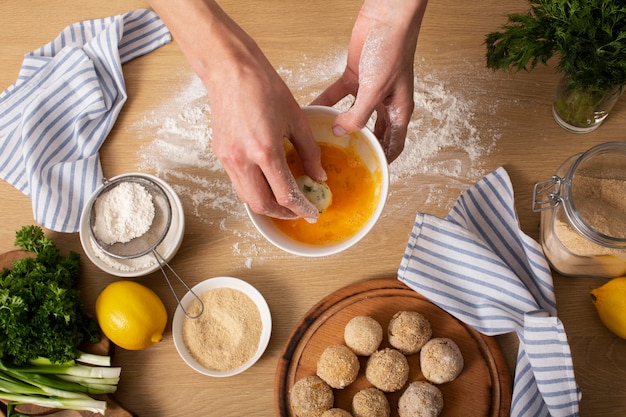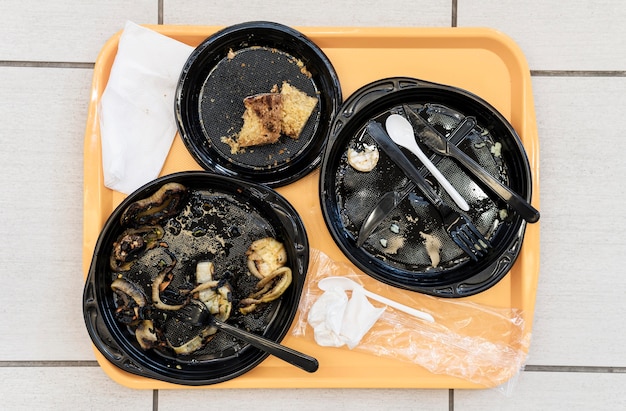You might have seen them at the farmers' market, those knobby, slightly odd-looking tubers. Maybe you've even been curious about what they are and how to use them. Well, I'm here to tell you all about sunchokes, also known as Jerusalem artichokes, and why they deserve a spot in your kitchen. They’re not potatoes, as many people think, but rather a type of sunflower tuber with a unique, earthy, and slightly sweet flavour. Believe me, once you give them a try, you'll be hooked!
(Part 1) Unveiling the Sunchoke Mystery

What Are Sunchokes, Really?
Sunchokes are the edible underground tubers of the sunflower plant, Helianthus tuberosus. They're not related to artichokes at all, but the name stuck because their flavour resembles artichoke hearts. And why “Jerusalem,” you ask? Well, no one's entirely sure. Some believe it's a corruption of the Italian word "girasole," which means "sunflower." Others think it's a mispronunciation of "terre-noble," which translates to "noble earth." Whatever the origin, it's a bit of a mouthful, isn't it?
Where Did They Come From?
These fascinating tubers originated in North America but have spread to other parts of the world, including Europe and Asia. They're hardy plants that thrive in various climates, making them a great option for gardeners and those who enjoy locally grown food. They’re also a fantastic choice for folks looking for low-carb, gluten-free, and high-fibre alternatives to other starchy vegetables.
Why Should You Care About Sunchokes?
Besides being a delicious and versatile ingredient, sunchokes are a nutritional powerhouse. They're a good source of vitamin C, potassium, and iron. They're also rich in inulin, a type of soluble fibre that's beneficial for gut health. Inulin is a prebiotic, meaning it fuels the beneficial bacteria in your gut, which can improve digestion, boost your immune system, and even aid in weight management.
(Part 2) A Sunchoke Primer: Understanding the Basics

Choosing the Right Sunchokes
When shopping for sunchokes, choose firm, unblemished tubers. Avoid any that are soft, mushy, or have dark spots. If possible, opt for locally grown sunchokes – you'll be supporting your local farmers and enjoying the freshest, most flavorful tubers possible.
Storing Sunchokes
To keep your sunchokes fresh, store them in a cool, dry place, like a pantry or basement. They'll last for several weeks, but they're best used within a few days of purchase. You can also store them in the refrigerator for up to a month, but they'll lose some of their crispness. And let's be real, who wants a mushy sunchoke? Not me, that's for sure!
Preparing Sunchokes for Cooking
Before cooking sunchokes, give them a good scrub under cold running water to remove any dirt or debris. You can then peel them with a vegetable peeler or leave the skin on. Personally, I often leave the skin on as it adds a nice bit of texture and flavour. But, hey, that's just me – you do you! Once peeled, you can chop them into small cubes, slices, or leave them whole, depending on your recipe.
(Part 3) Cooking with Sunchokes: Exploring the Possibilities

Now, here's where things get really exciting! Sunchokes are incredibly versatile and can be used in a wide range of dishes. I've got a few personal favourites I'll share with you, but don't be afraid to get creative and experiment with your own ideas. The possibilities are endless!
Roasting Sunchokes
Roasting sunchokes is a simple way to bring out their natural sweetness and nutty flavour. Just toss them with olive oil, salt, and pepper, then roast them in a preheated oven at 400°F (200°C) for 20-30 minutes, or until tender and slightly browned. You can add other seasonings like garlic powder, onion powder, or paprika to your liking. I like to toss in some fresh herbs like rosemary or thyme for a bit of extra flavour.
Sautéing Sunchokes
For a quick and easy side dish, try sautéing sunchokes in butter or olive oil. They're a great accompaniment to grilled fish or chicken. I like to add a little bit of garlic and lemon juice to the pan for a bright and tangy flavour.
Adding Sunchokes to Soups and Stews
Sunchokes add a delicious depth of flavour to soups and stews, especially wintery, hearty dishes. Think creamy butternut squash soup with a sprinkle of roasted sunchokes, or a rich beef stew with sunchokes and root vegetables. The possibilities are endless!
Sunchokes in Salads
Sunchokes can also add a nice crunch and texture to salads. They can be eaten raw, but I prefer to roast or sauté them first to bring out their flavour. Try adding sunchokes to a salad with roasted vegetables, grilled chicken, or chickpeas for a satisfying and healthy meal.
Making Sunchoke Fritters
If you're looking for a more indulgent way to enjoy sunchokes, try making them into fritters. Simply grate them, mix them with flour, eggs, and spices, and fry them in a pan until golden brown. Serve them with a dollop of sour cream or aioli for a delicious and satisfying treat.
(Part 4) Sunchoke side dishes: A Feast for the Senses
Sunchoke and Rosemary Gratin
This dish is a showstopper. It's rich, creamy, and comforting, with a touch of rosemary that takes it over the top. You'll need a few sunchokes, cream, milk, cheese, and a handful of fresh rosemary. The process is relatively simple: You slice the sunchokes, layer them in a baking dish, and pour over a creamy sauce made with milk, cream, and rosemary. Top it with cheese and bake until the top is golden and bubbly. Delicious!
Pan-Seared Sunchokes with Lemon and Herbs
This is a simple yet elegant side dish that is perfect for serving with grilled or roasted meats. Simply slice or cube your sunchokes, toss them with olive oil, salt, and pepper, then pan-sear them until golden brown and tender. Add a squeeze of lemon juice, a sprinkle of chopped herbs (like parsley, thyme, or oregano), and a drizzle of olive oil. It's simple, fresh, and bursting with flavour!
Roasted Sunchokes with Garlic and Parmesan
This recipe is a classic for a reason. It's incredibly easy to make and tastes absolutely divine. Simply toss your sunchokes with olive oil, garlic, salt, and pepper, and roast them until tender and slightly caramelized. Sprinkle with grated Parmesan cheese and serve hot. It's the perfect combination of salty, garlicky, and nutty flavours that will leave you craving for more.
(Part 5) Sunchoke Recipes for the Adventurous Cook
Sunchoke and Mushroom Soup
This soup is packed with flavour and is perfect for a chilly evening. It's earthy, creamy, and comforting, and it's easy to make. You'll need sunchokes, mushrooms, onions, garlic, broth, and cream. Simply sauté the onions and garlic, add the sunchokes and mushrooms, and cook until tender. Add the broth and bring to a boil, then reduce the heat and simmer until the sunchokes are very tender. Puree the soup until smooth, stir in the cream, and season with salt and pepper. Serve hot with a dollop of sour cream or crème fra??che and a sprinkle of fresh herbs.
Sunchoke and Apple Salad with Maple Vinaigrette
This salad is a perfect combination of sweet, tart, and savory flavors. It's light and refreshing, and it's perfect for a summer lunch or dinner. You'll need sunchokes, apples, walnuts, and a maple vinaigrette. Simply roast the sunchokes and apples until tender, then toss them with the walnuts and vinaigrette. Serve immediately. You can add some fresh herbs, like parsley or chives, for extra flavour.
Sunchoke and Goat Cheese Tart
This tart is a bit more involved, but it's worth the effort. It's a beautiful and delicious dish that's perfect for a special occasion. You'll need a pie crust, sunchokes, goat cheese, eggs, cream, and seasonings. Simply bake the pie crust, then fill it with a mixture of sliced sunchokes, goat cheese, eggs, cream, and seasonings. Bake until the filling is set and the crust is golden brown. Serve hot or at room temperature.
(Part 6) Sunchoke and Flatulence: The Real Talk
Let's address the elephant in the room: flatulence. Yes, sunchokes are known for their potential to cause gas. This is because of the inulin content, which, as we mentioned earlier, is a type of soluble fibre that is not broken down by the body. When inulin reaches the large intestine, it is fermented by the bacteria there, which produces gas. So, if you're worried about flatulence, you may want to start with small amounts of sunchokes and gradually increase your intake. You can also try cooking them to reduce their inulin content, or taking a digestive enzyme supplement.
However, don't let the potential for gas deter you from enjoying this delicious and nutritious vegetable. It's worth a bit of digestive discomfort for the flavour and health benefits they offer!
(Part 7) Sunchokes: A culinary adventure
As I've said before, sunchokes are a truly remarkable vegetable. They're versatile, flavorful, and packed with nutrients. They're also relatively easy to find and affordable. So, what are you waiting for? Give them a try!
I think you'll be pleasantly surprised by how delicious and satisfying they are. And remember, if you're new to sunchokes, start with small amounts and gradually increase your intake. You can also try different cooking methods to find what you like best. Experiment, have fun, and enjoy the ride!
(Part 8) FAQs About Sunchokes
What do sunchokes taste like?
Sunchokes have a slightly sweet, nutty, and earthy flavour that's reminiscent of artichoke hearts, hence the name "Jerusalem artichoke." They also have a slightly crunchy texture, especially when they're cooked.
How do you cook sunchokes?
Sunchokes can be cooked in a variety of ways, including roasting, sautéing, boiling, and frying. They can be added to soups, stews, salads, and fritters. You can also use them to make a delicious creamy gratin or a hearty tart.
Where can I buy sunchokes?
Sunchokes are typically available at farmers markets and specialty grocery stores. You can also find them online. Look for fresh, firm tubers, and avoid any that are soft, mushy, or have dark spots.
Are sunchokes good for you?
Yes, sunchokes are a good source of fibre, vitamin C, potassium, and iron. They are also a good source of inulin, a type of prebiotic fibre that helps promote gut health. Inulin has also been linked to a number of other health benefits, including weight management, improved blood sugar control, and a reduced risk of heart disease.
What are some of the best sunchoke recipes?
There are many delicious sunchoke recipes out there. Some of my favourites include:
- Roasted sunchokes with garlic and parmesan
- Sunchoke and mushroom soup
- Sunchoke and apple salad with maple vinaigrette
- Sunchoke and goat cheese tart
I encourage you to experiment with different recipes and find what you like best. The possibilities are endless! Happy cooking!
Everyone is watching

Corn on the Cob: The Ultimate Guide to Perfectly Cooked Ears
Healthy MealsAh, corn on the cob. Just the name evokes images of sunny days, barbecues, and that sweet, juicy flavour that ...

Perfect Pork Roast Oven Cooking Time: A Guide to Delicious Results
Healthy MealsThere's something truly satisfying about a perfectly roasted pork. The aroma alone is enough to make your mout...

Ham Cooking Time: How Long to Bake, Smoke, or Boil a Delicious Ham
Healthy MealsAh, ham. It's a classic, isn't it? A real crowd-pleaser, especially around holidays. And when done right, it'...

Scallops: The Ultimate Guide to Perfect Cooking
Healthy MealsAh, scallops. Those delicate, sweet, and utterly delicious morsels of the sea. They hold a special place in my...

Spaghetti Squash: The Ultimate Guide to Cooking and Serving
Healthy MealsRemember that time you saw spaghetti squash at the supermarket, looking all bumpy and strange, and thought, "W...
